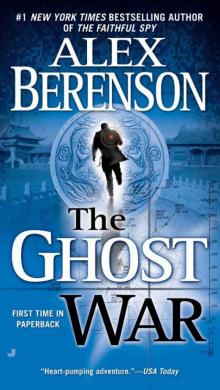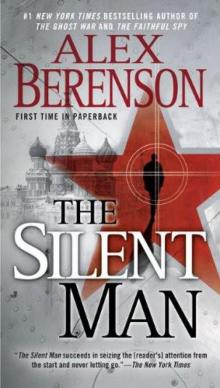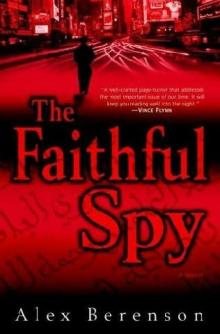- Home
- Alex Berenson
The Wolves Page 13
The Wolves Read online
Page 13
Jimmy smirked. He thought he’d already won, Duberman saw.
Then Duberman knew what to say. “You don’t take this offer, I quit.” He realized as he spoke that he was telling the truth. “I’m not some stripper in your pocket. I’m not married, no kids, I’ll get on a plane, you’ll never see me again.”
“You still have family.”
“What, you’re going to hit my seventy-year-old parents?” Duberman told himself Jimmy had to be bluffing. “Roller, I’ll give you and your boys five million dollars to go away.”
“I’ll make that in a couple years.”
“Only you won’t. Because I’ll walk. Look at me, Jimmy. I’m not lying.” Duberman leaned across the table, lowered his voice. “Something else. You been playing both sides, haven’t you? Bet you told your partners on this I was giving up a quarter of the profits. Maybe a third. Never half. Why you were always good with keeping ’em out of the casino, make sure they never met me. So better for everybody, we keep this between us.”
As he said the words, Duberman knew he was right. The Roller didn’t answer, but his breathing slowed. He folded his arms, sat back. He reached into the envelope that Duberman had given him and mumbled to himself. Watching him do the math was painful. Duberman wanted to offer a calculator.
“A hundred of these. Sixteen-point-three million.”
More money than Duberman had. To get it, he’d have to mortgage the two new casinos to the max. No matter. He wanted to jump on his chair and grab a bullhorn: I’m free. Only he knew if he agreed too fast, the Roller would jam him harder. “Can’t swing it, Jimmy. Eight?”
“Sixteen-point-three.”
“Ten.”
“Sixteen flat. Take it or leave it.”
“Where’m I gonna get sixteen million dollars?”
“The money you’re making, a bank’ll give it to you.”
Duberman silently counted to five. “Fifteen million. That’s the best I can do.” He extended his hand. Jimmy let it float. “C’mon, shake my hand, Jimmy.”
“Don’t push it.” But Jimmy shook.
“You made a great investment, you know. Too bad you can’t get the RJ to write it up.” The Las Vegas Review-Journal, the local paper.
Jimmy smiled. “Want to know the real reason I’m doing it? Places like this are gonna wipe the floor with you. You’ll be out of business in five years.”
—
JIMMY WAS WRONG. Duberman rebranded the Saloons as sleek sci-fi-themed casinos he called 88 Gammas. His fortune grew every year and exploded after he opened in 2001 in Macao. Too bad the Roller hadn’t been around to see Macao. He had died of a heart attack in 2000, high on coke and a stripper. Jimmy had always enjoyed life’s simple pleasures. Duberman wondered what Jimmy would make of his problems now. Boned like a porn star. Always had to prove you played by different rules. It comes back in the end.
Or maybe not.
Back in the day, Duberman’s friends would have told him he was a fool for even considering borrowing money from Jimmy the Roller. Too dangerous. Get in bed with a guy like that, you never get out. But if not for Jimmy, Duberman would have had to wait at least a decade longer to open his own casino. Maybe the chance would have vanished forever.
Instead Duberman had danced with the devil. And walked away without a streak of soot when the song ended. Now the orchestra was tuning up again. If what Garten said was true, and Duberman believed it was, General Cheung Han was a nasty piece of work. Under ordinary circumstances, Duberman would have banned him for life, forget the claptrap about shaming customers.
But these circumstances weren’t ordinary. Every intelligence service in the world would want to know Cheung Han’s secrets. He was a chip.
Right now, Duberman couldn’t afford to toss any of those away.
9
For his first week in Hong Kong, Wells watched Duberman’s mansion with the drones from Wright. Controlling them was easy enough, and their cameras had decent resolution. The live feeds weren’t hugely clear, because they uploaded through a satellite link that had limited bandwidth. But they also stored the video for Wells to play on his own computer later, a process no harder than popping in a DVD.
Still, as Wright had warned, the drones were vulnerable. Wells lost the first one on its third flight. After an hour looping around the mansion, it stopped responding to his commands, though its camera kept transmitting. Wells watched helplessly as it turned south and soared over the top of Victoria Peak. It flew another hour before running out of power and spiraling into the flat brown waters of the South China Sea. Wells couldn’t help but think of Malaysia Airlines Flight 370. He was almost certain that the problem was a Chinese air defense station on Victoria Peak. He cut the flights to thirty minutes, though he had no proof doing so would help.
Wells faced a second problem with the drones, one he hadn’t expected. Once they got more than a couple hundred meters up, they were basically invisible. But on takeoff and landing, they were obvious. The CIA could launch them from the bay west of Hong Kong Island off a speedboat. Wells had to use the balcony of the apartment he’d rented on the lower slopes of the Peak. The day after meeting Wright, he’d found a two-bedroom with a clear sightline to Duberman’s mansion. The place was made for a junior master of the universe, a thirty-something investment banker. It was sleek, modern, furnished with low metal tables and leather couches, a hundred shades of gray. On the midline between good taste and no taste at all. Much like the suits Wells had bought at Bloomingdale’s, or the replacements he’d picked up at a mall in Kowloon. Not that the clothes or the apartment had done much good.
The apartment was fifty-two stories up. Still, Wells had plenty of neighbors to notice him sending drones off the balcony. On his fifth launch, he saw a Chinese kid in a nearby building waving at him. Wells quickly flew the drone around a corner and out of sight. Fortunately, the kid was tiny, five at most. His parents probably wouldn’t believe him even if he told them. But eventually someone would see him and call the cops. In response, Wells restricted himself to one flight each morning, another in the afternoon, and two after dark.
After a week, Wells realized he needed another plan. The problem with the drones was both tactical and strategic. He was spending all day with them for two hours of surveillance. But even if he could have kept them airborne full-time, he doubted they would have helped. The video feed was mesmerizing. It showed him exactly where Duberman’s guards were posted, the time of their shift changes, their weapons and armor. He’d seen Gideon outside, and caught Orli in a Bentley limousine on her way down the mountain. But he hadn’t found any significant flaws in the security, and he hadn’t even seen Duberman. The guy spent all his time inside. Even if Wells had happened to see him outside, the drones didn’t have weapons.
Wells needed help from someone inside. But Gideon and Duberman’s other personal bodyguards had come halfway around the world to protect him. Why would they betray him? Maybe Orli, if he could reach her without alerting the men who watched over her.
Then Wells realized. An option he should have considered before. He called Wright, burner to burner.
“Wondered if you went home,” Wright said. They hadn’t spoken since the safe house.
“Busy playing with the stuff you gave me.”
“How’s it working?”
“I’m thinking I may need a more direct approach. The guy who handles security at the house—”
“The Brit—”
“Yes, him.” No names for this call. “Don’t suppose you have a picture of him?”
“I do not.”
“What about where he lives?”
Wright paused. “I can get that. You need it tonight?”
“Sooner’s always better.”
“Really think he’ll talk?”
“Mamma always said it never hurts to ask.”
—
>
TWENTY-FOUR HOURS PASSED, another day lost, before the address finally popped on his burner: 43 Tanner Road, Apartment 1604. Wife, kids. Not so subtly warning Wells to be careful of innocent bystanders.
Thanks.
On the tab.
Wells looked up the address, found a tall apartment building with narrow, enclosed balconies. Thirty-eight stories and a parking garage. A real estate website showed that Apartment 2104, presumably the same apartment five floors up, had sold a month before for fifteen million Hong Kong dollars. Roberts wasn’t taking care of a mortgage that size with his Special Air Service pension. Wells wondered how much Duberman was paying him. Maybe loyalty couldn’t be bought, but it could be rented.
Wells reached for his pistol and holster, then stopped. Roberts almost surely didn’t know the real reason why Wells was after his boss. Duberman could have told him anything. That Wells was a crazed gambler looking for revenge for losing everything. A Muslim convert who wanted to assassinate a billionaire Jew. If Wells expected Roberts to betray Duberman, he would need to build real rapport. Pulling a pistol on Roberts would hardly convince him of Wells’s good intentions. Instead Wells picked out his passport, his real passport. He would have to knock on Roberts’s door and hope the guy wasn’t in a shooting mood.
It was nearly midnight. Wells could have waited for sunrise, but he didn’t know how early Roberts went to work. Anyway, he was tired of waiting, tired of watching surveillance video on laptops. He jogged out of his building, dodged into an alley, hopped over a low wall into a pocket park. He came upon a teenage couple nestled together, making their own private world inside the city. A snatch of Springsteen came to him, Newly discovered lovers of the Everglades / They take out a full-page ad in the trades . . .
First time he’d thought of The Boss in a while. Anne hadn’t liked Springsteen much. Wells had tried to take her to a concert the year before. What? Three hours of hog calling? She later confessed she’d seen the line on the Internet. A cheap shot, and it annoyed Wells, but he couldn’t forget it. He had a hard time thinking of Bruce the same afterward.
The kissing teenagers disengaged, looked at Wells in annoyance. He left them to make out, got back to countersurveillance. Ten minutes later, he judged himself clean and turned downhill, toward the massive office towers closer to the harbor. Even at this hour, the air was thick and damp, in line with the forecasts, which promised heavy rain in the morning. Wells preferred the desert’s oven heat or, even better, the clean, dry air of the high plains, easy winds carrying the smell of new-mown hay.
Montana.
An idea struck him as he passed a 7-Eleven. Convenience stores in Hong Kong sold liquor. Wells bought a bottle of Dewar’s and a blank greeting card. Mr. Roberts: You’ve heard things about me. I’d like to give you my side.
—
FIFTEEN MINUTES LATER, a cab dropped him outside 43 Tanner. The building’s lobby was trying-hard showy, an indoor koi pond and lots of marble. The doorman wore a blue blazer short in the arms and smiled insincerely as Wells walked in. Wells guessed this building didn’t see many late-night visitors.
“I have a present for William Roberts in 1604.” Wells held up the bottle.
“I call up—”
“Can I bring it to him?”
The doorman shook his head.
“How about you? I’ll wait here, I promise.”
Another shake. “What your name?”
Wells had hoped the bottle would lure Roberts downstairs before Wells had to give his name, keep Roberts from calling the mansion and getting backup until Wells had gotten a chance to speak to him. But the play had failed. At this point, the doorman would surely call Roberts if Wells walked out. And the security cameras had already caught him.
“John.”
The doorman picked up the phone for a hushed conversation. When he was done, he pointed at a black leather couch. “Sit, please. He get dressed, come down.”
Wells decided he’d give Roberts ten minutes. Even if Roberts called Duberman immediately, the guards at the mansion would need at least twice that long to drive down.
The elevators never moved. But after eight minutes, a man walked through the front doors. He was black, light-skinned, six feet tall, with a cruiserweight’s sleek muscles and a touch of sweat that Wells guessed he had picked up running down the stairs. He wore a windbreaker, his right hand tucked inside the pocket, the pistol inside stretching the fabric.
“Mr. Roberts,” the doorman said. Wells cursed himself for not realizing Roberts would take the fire stairs and circle around the building instead of simply taking the elevator. Wells would have done the same.
Roberts looked him over in a way that suggested that Duberman had told him Wells was the devil incarnate. “John Wells, then?” His accent that was London by way of the West Indies.
“Guilty.”
Roberts didn’t smile. “Raise your hands, stand. Nice and slow, please.”
Wells did.
“Turn to the wall, place your palms on it.”
Again Wells complied.
“Have a weapon?”
“No.”
“You’re lying, I’ll shoot you right here, let the police decide if it was self-defense.”
Roberts frisked Wells, edged the passport out of Wells’s back pocket.
“Always carry your real passport?”
“Thought you might want to see it.”
“Turn around, take off your shoes, kick ’em this way.”
Wells did.
“Hugo Boss.”
“I’m classy like that.”
“Quiet.”
You brought it up.
“Anthony said you have something for me.”
“In the bag.”
Roberts reached in, came out with the scotch and the card. “Dewar’s, nice. And I’ve misunderstood you, have I?” He tossed Wells the bottle. “Take a drink. A good long one.”
“It’s for you.”
“Take a drink.”
Wells figured a religious argument wouldn’t get him far. He uncapped the bottle, took a pull. He’d forgotten how liquor burned the throat. He gagged, kept it down. “Want some?”
“No thank you.” Roberts sounded almost prim. “Put it down, let’s have a walk.”
Wells reached for his shoes.
“Those stay.” Roberts proving he was a pro. Aside from handcuffs, the easiest way to control a prisoner was to take his shoes.
They left the building, Roberts two steps behind Wells. “Left here, left again”—up a concrete staircase that scraped at Wells’s socked feet to a narrow wooded park that stretched along the hill behind Tanner Road.
“Braemar Park. Nice, innit?”
“If you say so.” The scotch was settled now and gave the night a pleasant glow.
Roberts wagged his pistol at a wooden bench under a tall tree with smooth gray bark, an acacia. “Take a load off. Isn’t that what you Americans say?”
Wells sat. “We snogging?”
“Only a .22, but this close it’ll do.” Roberts thumbed down the safety. “Give me one reason I shouldn’t shoot you right now.”
“If I’d wanted to hurt you, I would have brought a gun, not a bottle of scotch.”
“That’s one.” Roberts lowered the pistol a fraction. “You wanted to talk. Talk.”
“Thank you for not calling Duberman. For hearing me out.” Wells aimed for a respectful soldier-to-soldier tone. “Mind if I ask, did he tell you why he’s so nervous about me?”
“Like you don’t know.”
“Humor me.”
“He told me everything. I don’t blame you, she’s a beautiful woman, but come on, man.”
“Say again?”
“You’re obsessed with Orli, and you’re getting worse. It started with you going to her public even
ts. Then you got her number, probably through your NSA buddies, and started calling her, texting.”
“He told you I was ex-agency?”
“Of course. So Gideon called you, told you to cool it. You said no way, you were meant to be with her. Then in New York you crashed a photo shoot, scared her. She and Aaron went to Israel. But again you found out where she was. You came to Tel Aviv and they caught you there, too. So they came here. Now here you are again.”
Wells wanted to laugh. Of all the lies Duberman could have told, this one seemed the silliest. Though he saw why Roberts might go for it. Damsels in distress always played. “You believed him?”
“Why wouldn’t I? Orli’s had stalkers before. Though none as bad as you. They showed me the footage, you at the mansion in Tel Aviv. Plus she told me the same thing.”
Wells had always assumed that Orli was an innocent, that Duberman had lied to her and she had no idea about the false-flag operation. That he’d made her come to Hong Kong. But if Roberts was telling the truth, Orli was playing along with Duberman’s lies. Had she known all along? And if not, why had she cast her lot with him now?
Thirty billion reasons . . .
“I’ve never even met Orli. I’ve seen your boss once. He invited me to the mansion. And Vinny Duto was there.”
“So they’re lying, Aaron and Orli and Gideon, too.” Roberts didn’t hide his skepticism.
“Start to finish. They tell you anything about me besides that I was ex-agency?”
“Gideon said that his CIA contacts told him you’ve been having problems for years. Finally, they pushed you out. Quietly, because some people still remember that thing from Times Square way back when. He showed me your Wikipedia page.”
Duberman had turned the real story almost exactly inside out. The public had briefly learned Wells’s name years before, after he stopped a dirty bomb attack on Times Square. But he had asked the CIA and National Security Agency to scrub everything about him from public databases. Bit by bit, the agencies had done so. About the only trace of him left publicly was the Wikipedia page. Taking it down entirely would have attracted more attention than leaving it. But the entry was now only five paragraphs long and included just one picture, a slightly edited photo from Wells’s high school yearbook.

 The Power Couple
The Power Couple The Counterfeit Agent
The Counterfeit Agent The Midnight House
The Midnight House The Prisoner
The Prisoner The Ghost War
The Ghost War The Shadow Patrol jw-6
The Shadow Patrol jw-6 The Shadow Patrol
The Shadow Patrol The Deceivers
The Deceivers The Night Ranger jw-7
The Night Ranger jw-7 The Faithful Spy
The Faithful Spy The Prince of Beers (Kindle Single)
The Prince of Beers (Kindle Single) The Silent Man jw-3
The Silent Man jw-3 The Silent Man
The Silent Man The Wolves
The Wolves The Midnight House jw-4
The Midnight House jw-4 The Ghost Agent
The Ghost Agent The Faithful Spy jw-1
The Faithful Spy jw-1 The Prince of Beers
The Prince of Beers Twelve Days
Twelve Days The Secret Soldier jw-5
The Secret Soldier jw-5 The Ghost War jw-2
The Ghost War jw-2 The Night Ranger
The Night Ranger